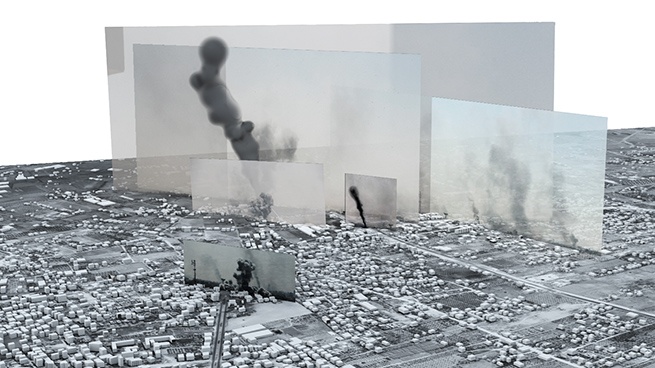Short Course in Forensic Architecture: The Image-Data Complex
21 Apr 2018
This event is sold out, but you can add your name to a waiting list by calling the ICA Box Office on 020 7930 3647. You may also try the returns queue at the ICA Box Office on the day of the event, as we release uncollected guest tickets just after start of each event whenever possible. By becoming an ICA Member, you're frequently able to book popular events first
As part of the exhibition Counter Investigations, Forensic Architecture leads five seminars organized around key concepts that underpin the agency's work, adding up to a short course in forensic architecture. These seminars take place in the ICA gallery spaces, within and around the investigations on display. Whereas these investigations were produced for presentation in juridical and political forums, the seminars gather an alternative forum in which the same evidence is interrogated theoretically and historically
Special multibuy offer
All five Forensic Architecture Short courses for £20/£18 concessions/£12 ICA Members
All are welcome to join these seminars, but we encourage people to attend all or a number of sessions where possible. Space is limited, so please register early
This seminar on the 'image-data complex' discusses the evolving politics and practice of images as data points. In our increasingly mediatised reality, where contemporary events produce a huge multiplicity of images and other data sources around them, the very act of viewing has gradually been transformed. To understand incidents means to be composing relations between images and navigating this composition – sometimes between a few scarce images; often between dozens if not hundreds coming from multiple sources, produced using different technologies and resolutions, and associated with different data-sets. Such a mode of composition, according to Forensic Architecture, is an architectural act, one necessitating an 'architectural image-data complex'. What new form of image and data practice does the proliferation of media evidence allow? And what is the role of the human investigator in an era of emerging artificial intelligence?
Members of Forensic Architecture introduce the concept of the image-data complex, in relation to the investigations including The Bombing of Rafah, The Enforced Disappearance of the 43 Ayotzinapa Students and Sea Watch vs. Libyan Coast Guard.
Invited participants—including artist Josh Begley, director of the Centre for Investigative Journalism James Harkin, citizen journalist and director of Bellingcat Eliot Higgins, documentary filmmaker Laura Poitras and investigative journalist and director of Airwars Chris Woods—will respond to and offer insights on the investigations and the concepts raised.
Following the seminar members of Forensic Architecture will lead a practice-based workshop on 'data and pattern analysis'.
Image caption: Forensic Architecture located photographs and videos within a 3D model to tell the story of one of the heaviest days of bombardment in the 2014 Israel-Gaza war. Forensic Architecture, 2015.
The Short Course in Forensic Architecture is organised in partnership with the MA Studio in Forensic Architecture, Centre for Research Architecture, Goldsmiths, University of London, led by Susan Schuppli and Lorenzo Pezzani. The practice-based workshops are organised by Christina Varvia




